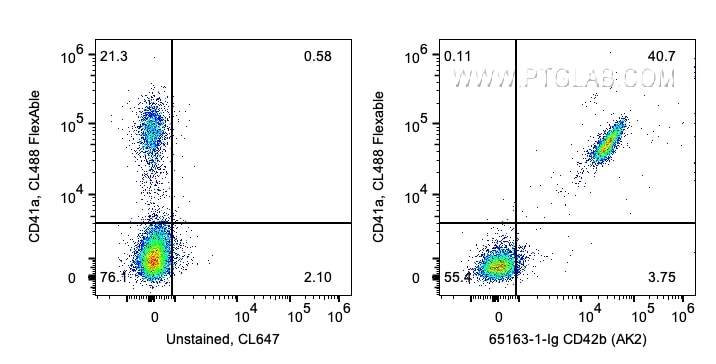CD42b Monoklonaler Antikörper
CD42b Monoklonal Antikörper für FC
Wirt / Isotyp
Maus / IgG1
Getestete Reaktivität
human
Anwendung
FC
Konjugation
Unkonjugiert
CloneNo.
AK2
Kat-Nr. : 65163-1-Ig
Synonyme
Galerie der Validierungsdaten
Geprüfte Anwendungen
| Erfolgreiche Detektion in FC | human peripheral blood platelets |
Empfohlene Verdünnung
| Anwendung | Verdünnung |
|---|---|
| This reagent has been tested for flow cytometric analysis. It is recommended that this reagent should be titrated in each testing system to obtain optimal results. | |
| Sample-dependent, check data in validation data gallery | |
Produktinformation
65163-1-Ig bindet in FC CD42b und zeigt Reaktivität mit human
| Getestete Reaktivität | human |
| Wirt / Isotyp | Maus / IgG1 |
| Klonalität | Monoklonal |
| Typ | Antikörper |
| Immunogen | Humane Thrombozyten |
| Vollständiger Name | glycoprotein Ib (platelet), alpha polypeptide |
| Berechnetes Molekulargewicht | 626 aa, 69 kDa |
| GenBank-Zugangsnummer | BC027955 |
| Gene symbol | GP1BA |
| Gene ID (NCBI) | 2811 |
| Konjugation | Unkonjugiert |
| Form | Liquid |
| Reinigungsmethode | Mit Protein-A-Affinitätschromatographie gereinigt |
| Lagerungspuffer | PBS with 0.09% sodium azide. |
| Lagerungsbedingungen | Store at 2-8°C. Stable for one year after shipment. |
Hintergrundinformationen
CD42b, also known as platelet glycoprotein Ib alpha chain (GPIb alpha), is a type I transmembrane glycoprotein of 135-145 kDa (PMID: 2656709). It is expressed on platelets and megakaryocytes. CD42b and CD42c (GPIb beta) are linked by a disulphide bond to form GPIb (PMID: 7660135). GPIb forms a noncovalent complex with CD42a (GPIX) and CD42d (GPV) and acts as a receptor for von Willebrand factor (vWF) and thrombin (PMID: 7660135; 3759960). The GPIb-V-IX complex mediates vWF-dependent platelet adhesion to blood vessels. Defects in the expression of CD42b result in Bernard-Soulier syndromes and platelet-type von Willebrand disease (PMID: 9371310).
Protokolle
| Produktspezifische Protokolle | |
|---|---|
| FC protocol for CD42b antibody 65163-1-Ig | Protokoll herunterladen |
| Standard-Protokolle | |
|---|---|
| Klicken Sie hier, um unsere Standardprotokolle anzuzeigen |


